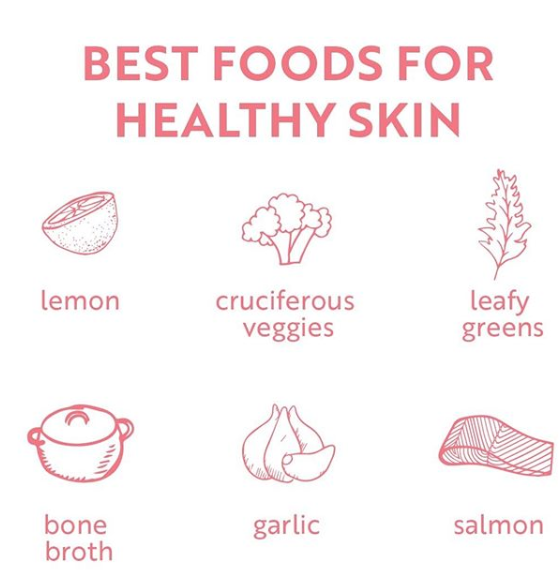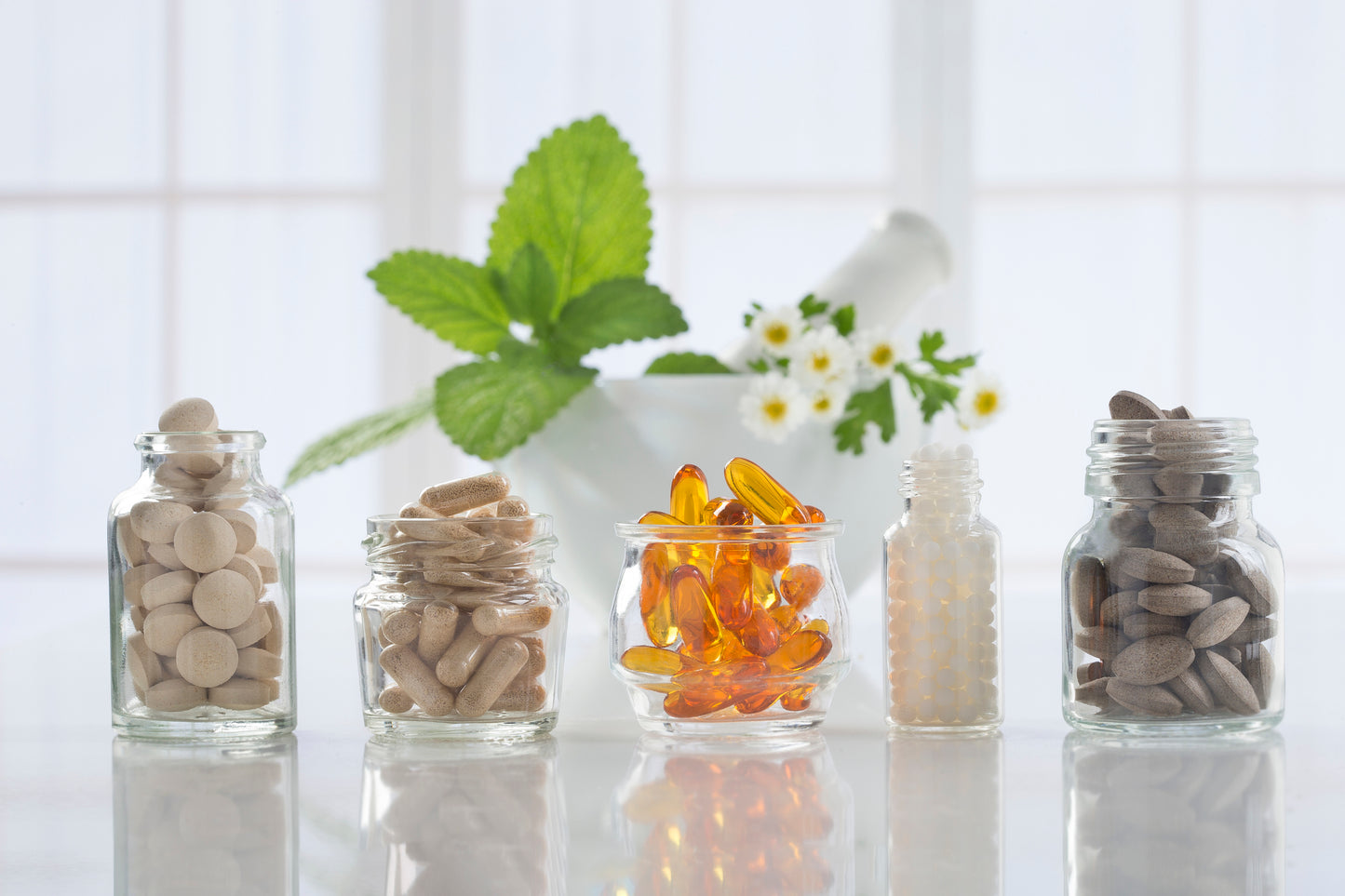
Best Supplements for Crepey Skin: Achieve Glowing Radiance
People sometimes say to me, “You have such great skin—you must have terrific genes!” But trust me: It’s not the genes. I work at it. It’s true that I inherited a nice Italian complexion. (Thanks, mom and dad!) But as I aged, time still took its toll in the form of wrinkles, dryness, and dullness. I tried all the creams and potions—don’t we all?—but I quickly discovered that the best way to have glowing skin is to build it from the inside out. And there’s plenty of evidence to prove it.
It’s well known that your nutritional status is closely linked to the health of your skin. Consider the outbreak of scurvy–a disease afflicting many sailors that caused fragile skin, bleeding gums, and poor wound healing among other things. It was eventually discovered that scurvy was really just a vitamin C deficiency. Because these sailors didn’t have access to fruits and vegetables, the only significant sources of vitamin C, for extended periods of time.
Plus, while some nutrients applied topically can penetrate the surface layers of skin and provide benefits, there is little evidence suggesting that topically applied nutrients are able to efficiently reach the deepest layers of skin responsible for strength and elasticity. So for more than a decade, I’ve banished skin-damaging grains and sugars from my diet and loaded up on skin-renewing foods like avocados, bone broth, coconut oil, blueberries, and leafy greens. As a result, I look younger than I did ten years ago.
But food isn’t my only secret! I augment my diet with a handful of supplements that help heal, smooth, and beautify my skin. And I generally recommend my patients do the same. You see, while I believe food should always be your primary source of nutrients, supplements are often also necessary. Especially given the fact that many people struggle with digestive issues, which can negatively impact your body’s ability to absorb nutrients.
And factors like stress are known to quickly deplete your body of critical nutrients. So, without further ado...here are the skin-boosting supplements I highly recommend:
#1 Supplement for Glowing Skin: Collagen
It’s no contest—collagen definitely earns the #1 spot on my list. It’s your skin’s “support system,” and when it breaks down as you age, your skin starts to sag and wrinkle. In fact, numerous experimental studies have shown that collagen powder (a.k.a. hydrolyzed collagen) is readily absorbed by the body and efficiently transported to the deepest layers of your skin where it works its magic. So in addition to drinking bone broth, which supplies you with the building blocks of collagen, blast your wrinkles with collagen powder shakes and smoothies.
#2 Supplement for Glowing Skin: Probiotics and Prebiotics
These two supplements work hand-in-hand. Probiotics are beneficial to gut microbes, while prebiotics provides the healthy fiber that helps your microbes thrive. Both are powerful gut healers—and a healthy gut is the biggest key to beautiful, youthful skin. I’ve written about the connection between your gut and skin here. And this connection helps explain why probiotics and prebiotics may offer great benefits when it comes to problem skin conditions that cause redness and irritation.
#3 Supplement for Glowing Skin: Vitamin C
Your body cannot synthesize new collagen without vitamin C. Period. This is one of the reasons why vitamin C is highly concentrated in the skin. There it helps to produce fibroblasts, which are cells necessary for collagen production as well as wound healing. Vitamin C also works as a potent antioxidant to protect your skin from UV photodamage as well as neutralize free radicals caused by toxins. This is so important because our world is filled with chemicals and pollution that our cells must fight against every day.
There is also evidence suggesting that vitamin C plays a role in the production of lipids in the outer layer skin. These lipids, also known as sebum, are essential for maintaining an optimal barrier function, which prevents water loss to keep your skin moist and supple. The lipid barrier also prevents potentially harmful toxins from invading.
However, vitamin C doesn’t work in a bubble. It relies on other enzymes and nutrients, such as vitamin E, carotenoids, and glutathione. In this small double-blind controlled study, the combination of vitamin C and vitamin E supplementation decreased the participant's reaction to sunburn. This implies that these nutrients may help reduce the risk of further damage caused by UV exposure. This study involving burn victims found that supplementation with vitamin C, vitamin E and zinc combined effectively helped reduce the time necessary for their wounds to heal. Further, this study found that a fermented papaya supplement produced a significant improvement in skin elasticity and moisturization. And what’s interesting is that papaya is a highly concentrated source of vitamin C as well as carotenoids. Both potent antioxidants.
Thus, I recommend taking vitamin C as part of the antioxidant complex or multivitamin as well as eating a rainbow of colorful fruits and vegetables. Shoot for a minimum of 1,000 mg.
#4 Supplement for Glowing Skin: Vitamin E
Vitamin E supports healthy skin due to its antioxidant activity. However, it also works at the immune level to benefit your skin. For example, this study found that almost 50% of participants with atopic dermatitis experienced a significant improvement in their condition with vitamin E supplementation. And 14% of participants experienced complete remission. On the other hand, less than 1% of participants given a placebo experienced significant improvement or remission.
Plus, vitamin E can help protect your sebum from oxidation, which can be irritating and contribute to inflammation. It is estimated that over 90% of Americans are deficient in vitamin E. Partly because of the standard American diet, which is extremely nutrient deficient. Plus, vitamin E is a fat-soluble vitamin. This means it must be consumed with fat in order for your body to absorb it. Thus, the fat-free dieters out there are missing out.
However, I must admit, adequate amounts of vitamin E are hard to get solely from food unless you’re paying close attention to it. Thus, I recommend a minimum of 15 mg (22 IU) of vitamin E daily as part of an antioxidant blend or multivitamin.
#5 Supplement for Glowing Skin: Vitamin D3
Vitamin D is actually not a vitamin at all, but rather a hormone. It is produced by the skin as a result of unprotected sun exposure. Thus, it can be tricky to get enough. Especially since it’s not highly concentrated in food. Which is why so many people are deficient.
Research has linked vitamin D deficiencies to several skin conditions. And in this study, patients are given a high dose vitamin D supplement (200,000 IU) after an induced sunburn experienced less redness. I recommend taking a separate supplement combining vitamin D and vitamin K.
I recommend 5,000 IUs of vitamin D3 a day. However, because vitamin D is a fat-soluble vitamin and can be stored in the body, I do recommend regular vitamin D blood tests and adjusting as needed.
#6 Supplement for Glowing Skin: Vitamin A
When it comes to vitamin A, there’s retinoids (found in animal foods) and carotenoids (found in plant foods). Carotenoids are potent antioxidants, but in order to exert a physiological effect on the skin, the carotenoids must first be converted to retinoids. For some, this process may be inefficient. And in these cases, supplementation with vitamin A in the retinol form may be necessary. Retinoids are involved in the expression of genes associated with skin structure and function.
They also have the ability to increase the production of skin cells, including fibroblasts which are responsible for collagen synthesis. Thus, retinoids are helpful when it comes to skin damage and wound healing.
When supplementing with vitamin A for beautiful skin, be sure your supplement contains both forms (retinoids and carotenoids). And shoot for 2000 to 3000 IU of retinol.
#7 Supplement for Glowing Skin: Omega-3 Fatty Acids
As you age, your skin cells lose their plumpness. I like to compare this to a row of soccer balls slowly going flat. Omega-3 fatty acids strengthen the membranes of these cells, plumping them up and making them bouncy again. Research has also shown that Omega-3 fatty acids help support your skin’s lipid barrier, reduce inflammation, increase your skin’s tolerance to sun exposure, and promote wound healing.
In this study, Omega-3 supplementation (500 mg of EPA and 500 mg of DHA daily) significantly reduced redness associated with acne in participants when compared to the control group. What’s also interesting is that another group was given 200 mg of GLA (gamma-linolenic acid), an Omega-6 fatty acid. And this group experienced similar results to those that were treated with Omega-3 fatty acids.
However, it’s important to note that the GLA in this experiment was from borage oil as opposed to highly processed, genetically modified vegetable oils, which I do NOT recommend.
#8 Supplement for Glowing Skin: Zinc
This trace mineral is found in relatively high concentrations in your skin as compared to most other tissues in your body. Zinc is an amazing skin strengthener due to many processes it’s involved in, including protein synthesis, DNA synthesis, collagen production, cell division, and even your immune response. Zinc also has antioxidant properties, which help protect your skin cells from damage.
This is essential to maintain a youthful glow and prevent wrinkles, fine lines, and age spots. In addition, zinc has been studied quite extensively as a treatment for acne because research has shown zinc deficiencies are common among those that suffer. However, the results are mixed. This is also true for researchers studying the effects of zinc on rosacea. One study found a statistically significant improvement after treatment with oral zinc supplementation while another found no benefit.
What’s interesting to point out, is that different forms and doses of zinc have been used in these studies. And this may be one factor contributing to the mixed results. For example, the study reported positive results when administered 100 mg of zinc sulfate three times a day for a total of 300 mg daily. However, in the contrasting study, 220 mg of zinc sulfate was given twice daily for a total of 440 mg a day. This means that zinc may not be your miracle mineral when it comes to solving all your skin problems, but it is necessary for healthy skin function.
And it could very well be a missing piece of your puzzle. So if you’re struggling with skin issues, I do suggest having your zinc levels checked as well as addressing any deficiencies. However, more isn’t always better. Too much supplemental zinc can impair your body’s ability to absorb other nutrients, such as copper. The daily minimum recommended intake is 15 mg for adults. And no more than 40 mg of supplemental zinc a day is recommended to avoid toxicity. In general, I recommend taking 30 mg of zinc bis-glycinate chelate daily for the best results.
#9 Supplement for Glowing Skin: Magnesium
Magnesium is known as nature’s “chill pill.” It helps the body relax and ease stress. And stress is a big factor when it comes to healthy skin, especially in the case of stress-induced acne. Magnesium also plays a role in DNA replication and is necessary for the production of glutathione. Both which are necessary to maintain youthful skin. When it comes to forms, I prefer magnesium malate or magnesium bis-glycinate. And I recommend approximately 500 mg daily.
#10 Supplement for Glowing Skin: Silicon
Silicon (not silicone) is a trace element essential for strong bones, skin, hair, and nails. Essentially, its role has much to do with collagen synthesis as well as strengthening existing collagen to give it more elasticity. This equates to firmer skin, a fuller head of hair, and stronger nails. However, despite being available in many foods, it’s often poorly absorbed. For example, bananas are rich in silicon. But only approximately 2% is absorbable.
Plus, absorption rates decrease as you age due to the production of less stomach acid. Thus, silicon supplementation is becoming more widespread. Researchers in this study administered silicon to middle-aged women with photodamaged skin. Participants experienced a statistically significant reduction in skin roughness and improved skin tone when compared to the placebo group. Improvements in hair and nail strength were also observed. There isn’t a daily recommended intake for silicon. However, most supplements contain 3 to 5 mg.
#11 Supplement for Glowing Skin: CoQ10
CoQ10 is a potent antioxidant available in some foods and also produced by your body. However, production naturally decreases as you age. A handful of studies have shown that supplemental CoQ10 may offer some pretty (pun intended) nice benefits for your skin. For example, this study found that supplementing with CoQ10 helped improve visual signs of aging, such as wrinkles, fine lines, and rough skin.
Supplements + a Healthy Diet = Glowing Skin
These supplements—combined with a diet of healthy fats, lean proteins, bone broth, and fruits and veggies—will strengthen your skin at the cellular level. And unlike Botox, which merely paralyzes your muscles temporarily, their effects are lasting. So if you want gorgeous skin for life, follow my lead: work at it! Wrinkle creams can be helpful, but you need to do both–feed your skin inside and out.

Keep Thinking Big and living BOLD!








